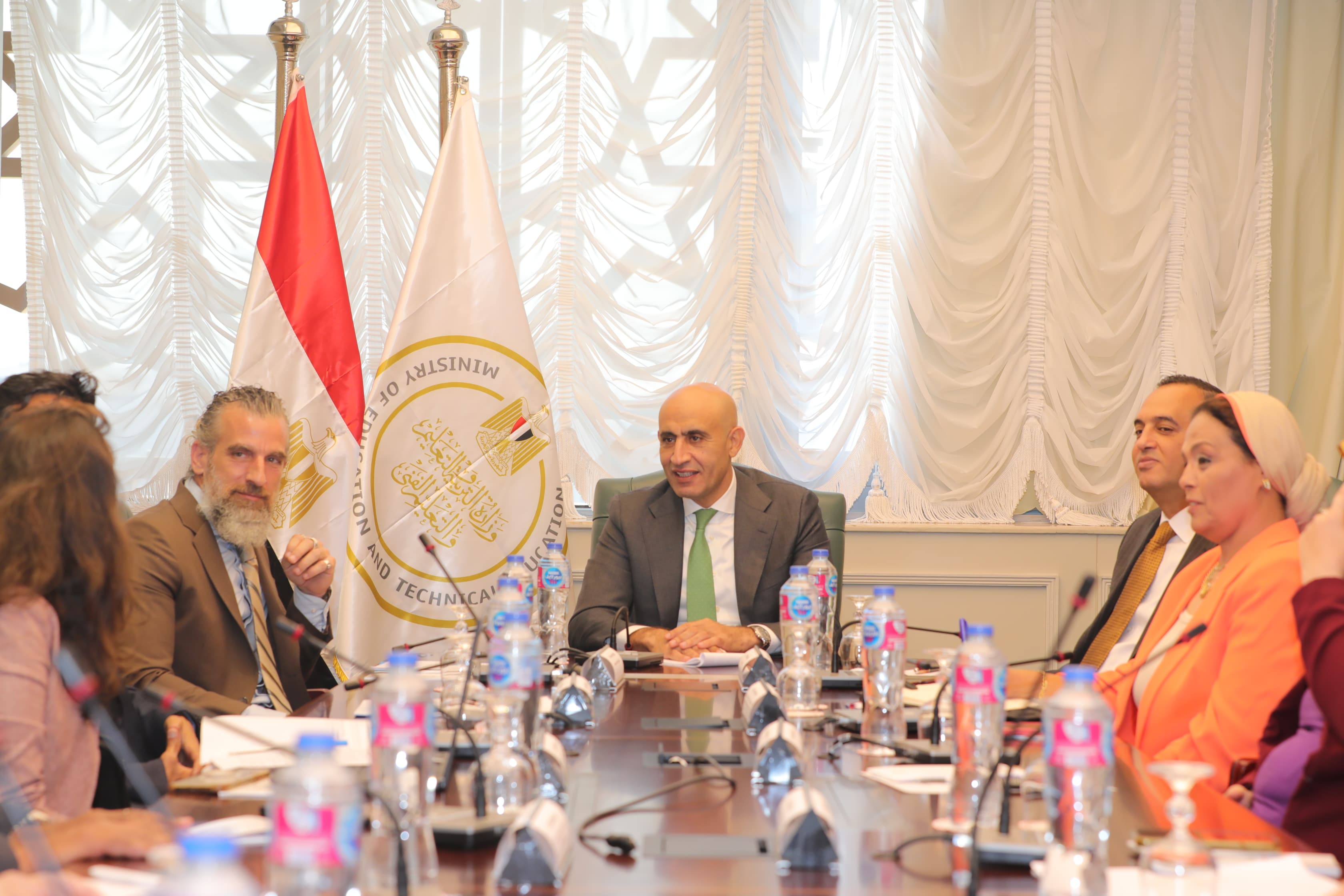The Minister of Education discusses with the UNICEF representative in Egypt

Mr. Mohamed Abdel Latif, Minister of Education and Technical Education, met with Mr. Jeremy Hopkins, UNICEF representative in Egypt, and his accompanying delegation. To discuss ways to enhance cooperation to support priority projects to develop the pre-university education system.
The meeting was attended by UNICEF, Shiraz Shakira, Head of the Education Department, and Dr. Hanem Ahmed, Director of the Educational Policy Programme.
On the part of the Ministry of Education and Technical Education, Dr. Ahmed Daher, Deputy Minister, Dr. Ayman Bahaa El-Din Al-Basal, Deputy Minister, Dr. Akram Hassan, Head of the Central Administration for Curriculum Development, Dr. Sherine Hamdi, Advisor to the Minister for International Cooperation and Agreements, and Professor Hala Abdel Salam, Head of the Central Administration for Public Education, attended. .
At the beginning of the meeting, the Minister appreciated the strong partnership with UNICEF, stressing the Ministry’s keenness to continue cooperation with the organization in a way that contributes significantly to achieving the goals of developing education, and contributes to providing high-quality education to every child in Egypt, as well as improving the quality of education. Digital through students benefiting from the vast digital platforms and resources provided by the Ministry, as well as cooperation to graduate qualified cadres capable of competing in the labor market.
During the meeting, the Minister reviewed the Ministry’s vision and efforts to deal with the most prominent challenges facing the educational system, and the recently announced package of measures to develop the pre-university education system, stressing that the Ministry’s vision to confront these challenges came from field visits to more than 12 governorates, and meetings with Directors of educational departments to discuss mechanisms for confronting the most important challenges, in addition to specialized experts reviewing these solutions, as a distinguished team of researchers in the research centers affiliated with the Ministry conducted a study on the 20 most important countries that are at the forefront in the field of education.
The Minister explained that the package of decisions regarding evaluating performance throughout the school year came with the aim of following up on students’ evaluation, increasing their ability to achieve academic achievement, developing their skills, motivating them and attracting them to attend schools, while the decisions related to restructuring secondary education aimed to provide sufficient time for the teacher to teach the content and perform a good educational process in the classroom in a number of ways. Credit hours for basic subjects, as well as developing students’ skills, and completing the curriculum in the allotted time; In order to prepare a generation capable of competing with other countries and in accordance with international standards, adding that the decisions also aim to reach class density to the ratio that allows an educational environment that achieves the maximum benefit for students and teachers, as well as addressing the deficit in the number of teachers through several technical solutions.
For his part, Jeremy Hopkins, UNICEF representative in Egypt, expressed his appreciation for the fruitful cooperation with the Ministry of Education, stressing UNICEF’s commitment to supporting the ministry’s efforts aimed at improving the quality of education and achieving equity in access to quality education by providing a comprehensive and safe educational environment for all. Children in Egypt.
The UNICEF representative in Egypt also praised the package of measures that the ministry has been implementing recently to develop the educational system in Egypt, stressing that Egypt has the largest educational system in addition to its pioneering role in Africa and the Middle East.
The meeting discussed areas of cooperation between the Ministry and the organization, which include the National Program for Basic Skills to improve learning outcomes, the development of an educational remediation program that focuses on training in teaching and methodologies to compensate for educational loss in reading, writing and arithmetic, and the promotion of digital skills in the primary stage, and the in-service capacity building program for teachers, which Focuses on accelerating core learning and digital skills.
The two parties agreed on the importance of solutions based on studies and evidence, in addition to completing the process of cooperation with UNICEF as the coordinating agency for the Global Partnership for Education through programs to develop capabilities for strategic planning and policy implementation, as this comes after Egypt’s success in joining the Global Partnership for Education (GPE), as was agreed upon. To continue cooperation in the areas of comprehensive integration of children into general education schools.
The two sides also agreed to continue cooperation in enhancing life skills and global vision for secondary school students by exchanging experiences with their peers in other countries, as well as launching a comprehensive study to identify the causes of dropout from education and develop practical and preventive recommendations to reduce this phenomenon.
